Machine Learning Revolutionizes Cancer Treatment Through Genetic Insights
The fight against cancer has taken a significant leap forward with the groundbreaking work led by Ruishan Liu, an Assistant Professor of Computer Science at USC. This pioneering study has identified how specific genetic mutations can dramatically influence the outcomes of cancer treatments, offering hope for more personalized medicine approaches. It stands as the most extensive investigation of its kind, analyzing data from over 78,000 cancer patients who have undergone a range of treatments, including immunotherapies, chemotherapies, and targeted therapies for 20 different types of cancer.
Understanding Genetic Influence on Cancer Treatments
Advanced computational analysis allowed the research team to uncover nearly 800 genetic variations that have a direct impact on survival rates. Furthermore, the team identified 95 key genes that are significantly associated with survival in major cancer types such as breast, ovarian, skin, and gastrointestinal cancers. Armed with this knowledge, the researchers have developed a machine learning tool specifically designed to predict the response of patients with advanced lung cancer to immunotherapy treatments.
The study firmly establishes the role of genetic profiling in personalizing cancer care. By comprehending how individual mutations affect treatment responses, oncologists can avoid ineffective therapies and instead concentrate on those with the highest efficacy for each patient.
Detailed Insights Published in Nature Communications
The study, featured in the renowned journal Nature Communications, underscores the importance of genes like TP53, CDKN2A, and CDKN2B in shaping treatment outcomes, confirming these findings with extensive real-world data. This comprehensive study included collaboration with notable co-authors from Genentech, Roche, and Stanford University, demonstrating a successful interdisciplinary effort.
The Role of Genetic Mutations in Cancer
Genetic mutations, which are alterations in DNA sequences, play a critical role in how cancer develops and how a patient might respond to treatment. These mutations can occur spontaneously or be inherited, affecting tumor behavior and treatment efficacy. In modern cancer care, genetic testing is increasingly utilized to identify such mutations, enabling the selection of more precise and effective treatment strategies.
For instance, patients diagnosed with non-small cell lung cancer (NSCLC) often undergo genomic testing for mutations in genes like KRAS, EGFR, and ALK. These tests determine whether targeted therapies or immunotherapies are appropriate, potentially enhancing treatment success.
Significant Findings from the Study
The pivotal insights from the study include:
- KRAS mutations in advanced NSCLC were linked to poorer responses to EGFR inhibitors, indicating the necessity for alternative treatment strategies.
- NF1 mutations showcased a dual role, as they improved immunotherapy responses but worsened reactions to certain targeted therapies, underscoring their complex impact on treatment.
- Mutations within the PI3K pathway, known for regulating cell growth, exhibited varied effects depending on the cancer type, affecting responses in breast, melanoma, and renal cancers.
- Mutations involved in DNA repair pathways enhanced the effectiveness of immunotherapy in lung cancer by increasing tumor instability.
- Mutations within immune-related pathways were associated with improved survival rates for lung cancer patients treated with immunotherapy, indicating that not all mutations impede treatment efficacy.
Advancements in Predictive Tools
The study challenges the traditional, one-size-fits-all treatment approach in cancer care, pushing forward the concept of precision medicine that tailors treatment based on a patient's unique genetic profile. While copious data exist on mutations, only a small fraction are linked with clinically validated treatments. This gap limits potential real-world applications and patient benefits.
To address this limitation, Liu's team leveraged machine learning to examine how multiple mutations interact and influence treatment outcomes. They developed a Random Survival Forest (RSF) model aimed at refining treatment recommendations for lung cancer patients, allowing for the integration of large-scale, real-world data with advanced machine learning techniques to uncover new mutation-treatment interactions.
The study represents a critical step toward precision and personalized cancer treatment. Although further clinical trials are required, the use of computational science is proving transformative in converting complex clinical and genomic data into actionable insights, ultimately improving patient care across the globe.
출처 : Original Source

